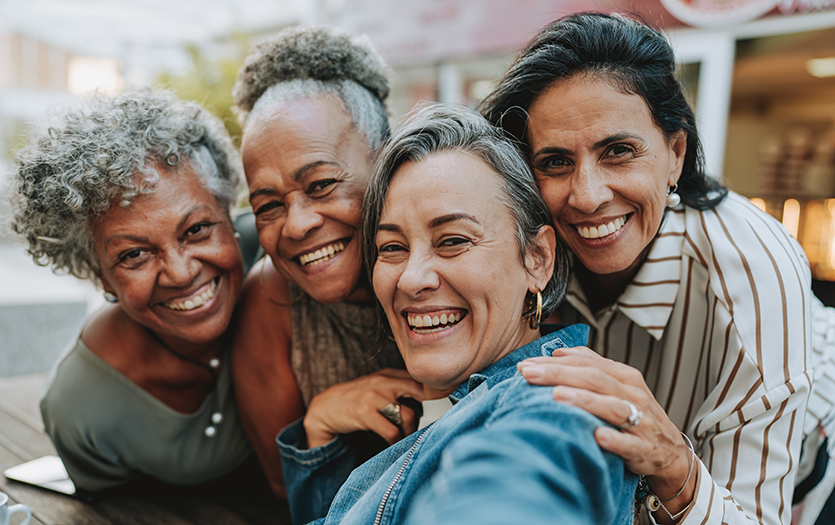When we experience the death of a loved one, the holidays can bring a flood of emotion. As Melissa Buesching, community outreach coordinator, Parkview Center for Healthy Living Warsaw, explains, finding a way to cope can mean changing traditions, accepting help and taking some extra time to take care of yourself. See what other strategies she suggests …
Why the holidays trigger grief for some.
I think for all of us, the season makes our senses come alive. We seem to have a more heightened sense of awareness and feel more sentimental. It’s the time of year when we think of family and friends the most. With that being said, the anticipation of the holidays can trigger grief and increase anxiety for those who have experienced the death of loved one, especially if it’s their first holiday without them.
When we are experiencing grief, the holidays have a different feel. It can be difficult to watch others who are in a grateful, celebratory mood when we feel overwhelmed, lonely or sad. Our senses can awaken memories that once brought so much joy, but now feel like heartbreak. Perhaps it’s a song your grandmother used to play on the piano, or the smell of your mother’s sugar cookies. Maybe a loved one enjoyed the lights on the tree. The sights, sounds, smells and textures of the festivities are rich with nostalgia. Our memories arise from somewhere deep inside us, which forces us to realize how much our lives have been changed by our loss.
How to cope with holiday grief.
- Self-care. First and foremost, you have to take care of you. Understand that self-care is in no way a selfish act. This concept can be applied in a variety of ways. It can mean avoiding alcohol to self-medicate your mood. It can mean getting outside to walk as the weather permits. It can mean making time for physical exercise. It can mean journaling, taking pen to paper, to get your thoughts and feelings out. And it can mean taking the opportunity to treat yourself to something you always wanted but never allowed yourself.
- Acknowledge your feelings. Allow yourself to grieve and also to rejoice in the season. It’s OK to feel joy, sadness, anger. Recognize that every family member has his/her own unique grief experience and may have different needs related to celebrating the holidays. No one way is right or wrong. Experiencing joy and laughter does not mean you have forgotten your loved one.
- Be realistic. Remind yourself that this year might look a little different and, again, that’s OK. Maybe you don’t want to handle the same responsibilities you’ve had in the past. Think about the tasks and events you have ahead of you and mindfully consider if you want to continue them. There is always next year or the year after. If others offer to cook or shop or decorate for you, let them. Whatever you decide, be at peace with your decision.
- Reach out. This time of year especially, choose to surround yourself with positive people who care about you. If you need to alter a tradition, be clear with your family. Sometimes memories can be a source of comfort in the grieving process. Consider sharing stories and looking at photo albums to honor your loved one.
- Do for others. It is always more blessed to give than to receive. What a great time of year to consider giving a donation or gift in memory of your loved one. Invite a guest who might otherwise be alone for the holidays. Adopt a needy family during the holiday season. Visit a nursing home or volunteer at a local shelter. Giving back always feels good!
- Create new traditions. Not everyone has a Norman Rockwell holiday. While some people find comfort in the old traditions, others might find them painful. Communication is key when discussing activities you want to include or exclude from your family celebration this year. Some examples of creating new traditions might be:
- Lighting a candle in honor of your loved one
- Creating a memory box filled with items that remind your family of your loved one
- Visiting the cemetery and decorating the memorial site
- Honoring your loved one by serving their favorite meal, playing their favorite song(s) or playing their favorite game after dinner
No matter what you choose to do, the most important thing to remember is that there is no right or wrong way to celebrate the holiday season after the death of a loved one, and that the best way to cope is to plan ahead, communicate, get support from others and take it as easy as you please.
How to offer support to those suffering a loss.
In general, the best way to help those who are grieving during the holidays is to let them know you care. Offer help by simply listening. Be mindful of the fact that we all grieve in our own way and in our own time. It’s when we become unable to manage our grief we need to seek professional help.
Our community hospice organizations are a valuable resource as are our churches. There are grief counselors and clergy who can help people who are struggling with grief and loss. Hospice professionals offer these 10 tips to help someone grieving through the holidays:
1. Be supportive of the way the person chooses to handle the holidays. Some may wish to follow traditions; others may choose to avoid customs of the past and do something new. It’s okay to do things differently.
2. Offer to help the person with decorating or holiday baking. Both tasks can be overwhelming for someone who is grieving.
3. Offer to help with holiday shopping. Share catalogs or online shopping sites that may be helpful.
4. Invite the person to join you or your family during the holidays. You might invite them to join you for a religious service or at a holiday meal where they are a guest.
5. Ask the person if he or she is interested in volunteering with you during the holidays. Doing something for someone else, such as helping at a soup kitchen or working with children, may help your loved one feel better about the holidays.
6. Donate a gift or money in memory of the person’s loved one. Remind the person that his or her loved one is not forgotten.
7. Never tell someone that he or she should be “over it.” Instead, give the person hope that, eventually, he or she will enjoy the holidays again.
8. Be willing to listen. Active listening from friends and family is an important step to helping some cope with grief and heal.
9. Remind the person that you are thinking of him or her and the loved one who died. Cards, phone calls and visits are great ways to stay in touch.
10. Follow up after the holidays to check in. Given the activity of the season, some people may make it through the holidays without any issues but they might find the post-holiday period to be more difficult. So checking in after the holidays to see how he or she may be doing is helpful.
For more on this topic, join us for Grief Survival Strategies for the Holidays, Wednesday, December 14, 6-7 p.m. at the Parkview Center for Healthy Living located in the Parkview Warsaw YMCA.





